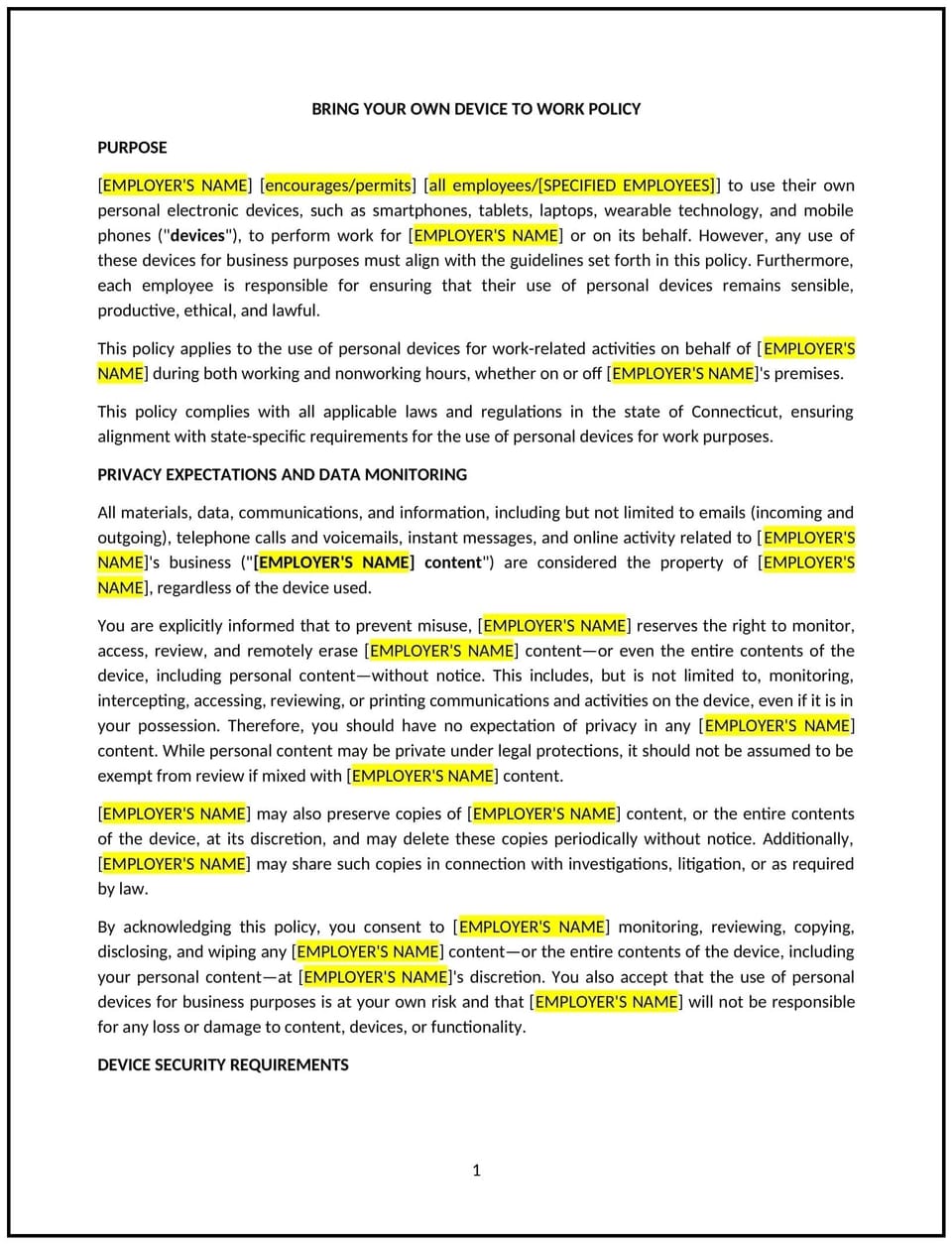Bring your own device to work policy (Connecticut): Free template

Bring your own device to work policy (Connecticut)
A Bring Your Own Device (BYOD) to work policy helps Connecticut businesses manage the use of personal devices (such as smartphones, laptops, and tablets) for work purposes. This policy outlines the acceptable use, security requirements, and responsibilities of employees when using their personal devices for work, ensuring the protection of company data and maintaining a professional environment.
By implementing this policy, businesses can leverage the flexibility of BYOD while safeguarding company information and ensuring compliance with relevant regulations.
How to use this Bring Your Own Device to work policy (Connecticut)
- Define acceptable devices: Specify which types of personal devices are permitted for work use, such as laptops, smartphones, and tablets, and outline any restrictions on usage.
- Establish security requirements: Require employees to adhere to security protocols, such as using strong passwords, enabling encryption, and keeping devices up to date with security patches.
- Address data protection: Clearly explain how company data should be stored and accessed on personal devices, including any restrictions on downloading or sharing sensitive company information.
- Set boundaries for usage: Define acceptable usage of personal devices during work hours, including restrictions on personal use that could interfere with productivity or security.
- Establish a response plan: Outline what actions the business will take in case a personal device is lost, stolen, or compromised, including immediate reporting and remote wiping of company data if necessary.
Benefits of using this Bring Your Own Device to work policy (Connecticut)
This policy offers several benefits for Connecticut businesses:
- Promotes flexibility: Allows employees to use personal devices, which may increase productivity and employee satisfaction by enabling them to work on the go.
- Supports security: Helps protect company data through clearly defined security protocols and proactive measures in case of device loss or compromise.
- Reduces costs: Minimizes company costs by leveraging employees’ personal devices rather than providing company-owned devices for all employees.
- Increases productivity: Enables employees to use devices they are already familiar with, streamlining workflows and improving efficiency.
- Mitigates risk: Establishes clear guidelines and accountability for the use of personal devices, reducing the risk of data breaches or unauthorized access.
Tips for using this Bring Your Own Device to work policy (Connecticut)
- Communicate clearly: Ensure all employees understand the policy and their responsibilities when using personal devices for work purposes.
- Implement training: Provide regular training on security best practices, such as recognizing phishing attempts and maintaining device security.
- Use mobile device management (MDM) tools: Consider using MDM software to monitor and secure personal devices that access company data.
- Monitor compliance: Regularly review employees' adherence to the policy and take corrective actions if necessary to ensure data protection.
- Review periodically: Update the policy as needed to reflect changes in technology, security regulations, or company needs.
Q: How does this policy benefit my business?
A: The policy allows businesses to leverage the flexibility of BYOD while maintaining control over data security, reducing costs, and improving employee productivity.
Q: What devices are allowed under this policy?
A: The policy specifies which types of personal devices can be used for work, typically including smartphones, tablets, and laptops. Devices must meet security standards set by the company.
Q: Are there security requirements for employees using personal devices?
A: Yes, employees are required to use strong passwords, enable device encryption, and regularly update their devices to protect company data.
Q: What should employees do if their device is lost or stolen?
A: Employees must report the incident immediately. The company may take actions such as remotely wiping the device to protect company data.
Q: How often should this policy be reviewed?
A: The policy should be reviewed annually or whenever there are updates to Connecticut laws, technology trends, or company security requirements to ensure it remains effective and compliant.
This article contains general legal information and does not contain legal advice. Cobrief is not a law firm or a substitute for an attorney or law firm. The law is complex and changes often. For legal advice, please ask a lawyer.


